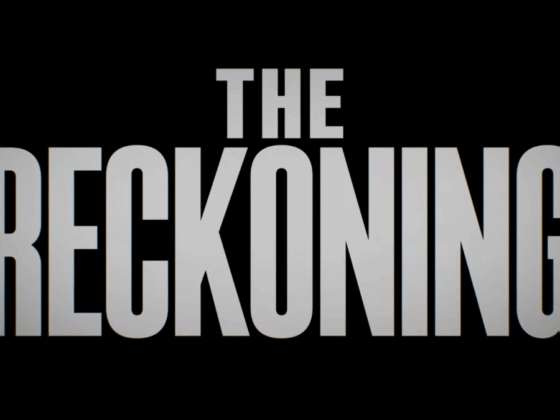
A Murder of Crows isn’t only the name of a late-’90s Cuba Gooding Jr. thriller streaming on Tubi. It’s a phrase loaded with omen. During the Middle Ages, people decided that a group of crows would not be referred to as a “flock” like sheep or even a “pride” like lions, but a “murder” because they hovered around death — carcasses, battlefields, and cemeteries. Fitting, then, albeit less obvious, that Mick Jenkins and EMIL borrow the phrase for their collaborative album, A Murder of Crows.
The “murder” at hand isn’t necessarily a cold-hearted killing or a violent massacre. In all actuality, it’s more like decay. With Jenkins’ economic, yet thoughtful writing and EMIL’s dynamic production, the project moves through topic after topic as it outlines a society that’s not lifeless, but certainly in dire straits. A digital world where validation is currency, a spiritual one where the balance is overdue. However, the Alabama-born, Chicago-bred MC living in North Carolina doesn’t preach. Rather, he observes, implicates himself, adjusts the mirror, and continues to think out loud. The result isn’t mourning — it’s diagnosis, whispered (and sometimes, shouted) over production that oscillates between sounding like the sky about to split (“Dream Catcher”) to feeling like it’s last call at a slightly chilly, autumn Sunday night at a speakeasy (“Words I Should’ve Said”).
Beautiful is not an adjective often used to describe a murder of crows. But, as I write this review, it feels like the only word worthy of being associated with its opening track — “Dream Catcher.” Coated in soulful background vocals, crashing keys, and subtle drums, Mick Jenkins’ pressing vocals sail through a sea of topics, ranging from outgrowing old friends to the addiction of wealth, until he admits, “These verses [are] depositions, I subpoenaed myself.” That line — half confession, half confrontation — is the key to the whole record, in my opinion. The charm of Mick Jenkins and EMIL’s collaborative LP lies in their ability to confront what Jenkins seemingly finds hardest to discuss or reflect upon, but is necessary to facilitate growth. Jenkins isn’t chasing catharsis so much as documenting the attempt. To “subpoena” himself is to say: I am both witness and defendant. Growth, he seems to realize, is a process of cross-examination — messy, necessary, and, yes, beautiful.
On “Words I Should’ve Said,” a duet with the UK’s wonder woman with a pen, ENNY, the practice of cross-examination comes into clear focus as he attempts to confront how his inability to communicate with those he loves most often leaves both parties in pain. While lines like “I wasn’t thinking about you. I like to move with the wind,” feel direct and honest, it’s ENNY’s response that outlines how Jenkins is, in all actuality, caught between pride and tenderness, stumbling through the language of love. Rapping with the energy of Nikki Giovanni replying to James Baldwin, ENNY all but says, “Because I love you, I get the worst of you.” Why is it that this man, who is so good at conveying his thoughts and emotions to the world over music, is so poor in communicating his thoughts, feelings, and intentions with me? However, she doesn’t say that. Instead, she puts it like this:
How you seem to think that words would bring me healing?
Words you could’ve said, could’ve read, could’ve wrote
I hope the hindsight make you sick and choke
I keep you on a need to know
And n—a you don’t need to know, you need to grow
The ENNY-assisted track glides, or rather, dissolves, into “Eating Crow (Interlude)” — a cloud of ambient, yet filling sound that hangs like cigarette smoke. As the cloud fades, Jenkins flips the camera outward. “Workers’ Comp,” “Pundits (YAPPERS),” and “DeadStock” form a loose trilogy of scolding, side-eye, and contempt. First, “Workers’ Comp” aims at the bench-sitters, those who feel entitled to a slice of a pie they never baked. Making matters worse, as Jenkins points out, many of them have never baked a pie of their own at all. “Pundits” keeps the same energy but turns sly — its piano lines smirk while Jenkins toys with the know-it-alls of the digital age, like Twitter doctorates who claim to know anything about everything or music critics who have never made an album themselves. Then, “DeadStock” closes the run with a flutter of drums and ghostly keys, moving from the yappers to the attention seekers who chase clout as if it’s the vaccine for the ills plaguing their lives. Through it all, EMIL’s production varies to keep the listener guessing, but the lyrical messaging feels consistent, as if Jenkins is slowly painting a picture of the world he sees developing around him.
“DeadStock” sheds its skin and shapeshifts into the dusty, grainy “On VHS,” a 130-second lyrical exercise that pairs memorable metaphors with an amalgamation of the messages sprinkled throughout the three previous tracks. Nearing the end of the album’s seventh track, he seemingly teases the messaging of its successor as he raps, “They been tryna short our product and force byproducts down our throat. But of course, I got us.”
Does he have us? The neo-soul-leaning “Move” provides the answers yes, but not without doubt. Jenkins wrestles with survival and authenticity, measuring creation against exhaustion. As he works through this internal battle, he looks up and sees someone “simply existin’ in [their] magnificence [even when there’s] overwhelmin’ hate in the room.” That sight alone — someone salvaging joy in a pit of pain — is the revolution he’s been writing toward.
Jenkins and EMIL’s ability to push forward is rewarded with the celebratory “Shining.” Slower in tempo, yet euphoric in its writing, “Shining” throws a party for the big and small victories equally. Whether you’re in a white tee with a fresh fade or you’re Shyne putting on for your nation, in Jenkins’ eyes, you’re shining.
As refreshing as “Shining” feels in its 161-second runtime, the album truly peaks in its final moments. “Coco Gauff” hits like a late rally and a few bars in, you’re making that face. You know? The one where you nod your head and your face looks like you smelled the worst thing in your entire life, yet you’re happy?
Jenkins folds money talk, power talk, and protest talk into an audible stream of consciousness that never loses its rhythm. Most writers, myself included, would stumble if they tried to connect record-label greed to power-hungry police states in a single verse, but Jenkins and EMIL make it happen.
Then Spotify get they hands out my pocket
Whole doorbell and niggas are still knocking
A whole Orwell I get into this arc
Y’all enter it by twos
Seven pure breds, my niggas gone ride too
Know the pigs ate we call them Kaiju
Leave you in the Ash, don’t wanna be Raichu
“Bigger Than Ever” finishes A Murder of Crows with a jazzy, uplifting tune. Kaylan Arnold matches the hopefulness of Jenkins’ verses with a hook that swells with triumph. “We’re going to be bigger than ever,” she repeats.
Mick Jenkins is a decade and change into his career, yet the hook resonates with him and his career trajectory. He’s never chased Billboard validation, but the spotlight seems to have found him again — the same glow now catching EMIL, whose production looks at the word “genre” as an archaic term. A Murder of Crows lands in a country barreling toward a recession, culture wars, and mass political division. Jenkins answers with something deceptively simple: songs that feel like conversations with loved ones, close friends, and occasionally, therapists. He’s the critic and the everyman, diagnosing the world while admitting he’s part of its mess. The album doesn’t offer escape from the fire; it sits beside you in the smoke, reminding you that self-reckoning is also survival.







